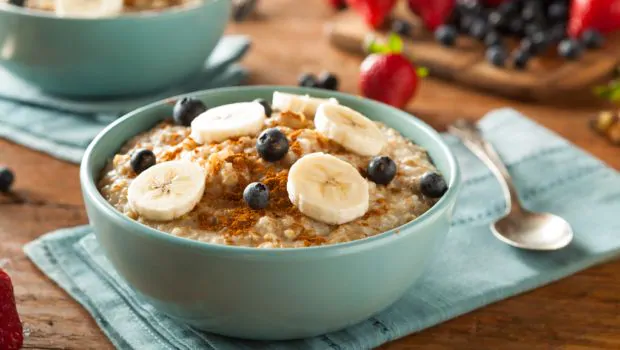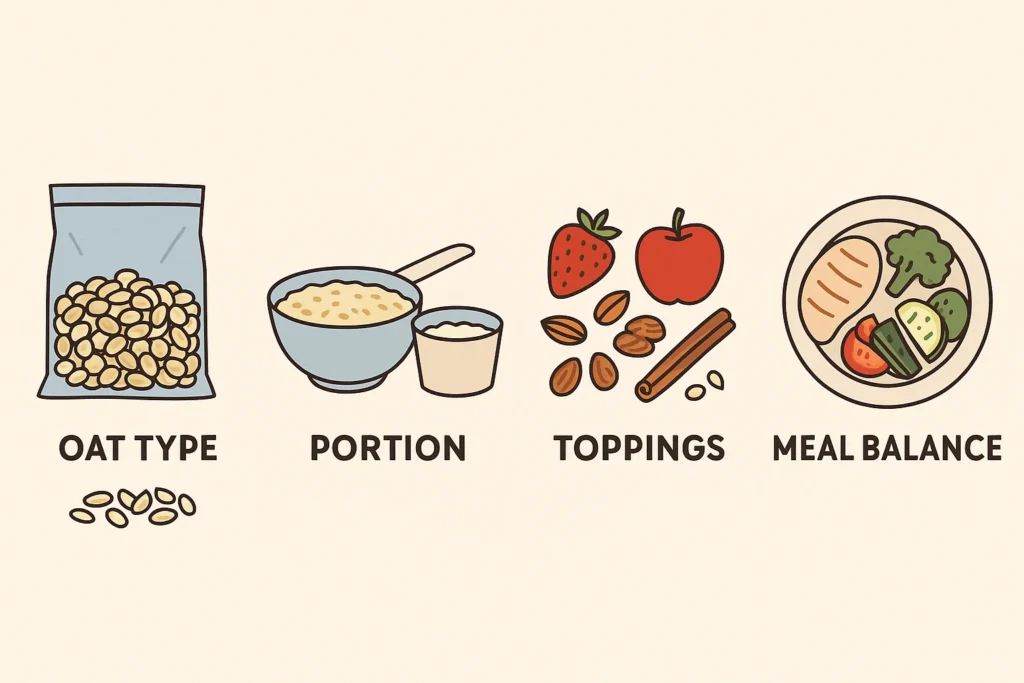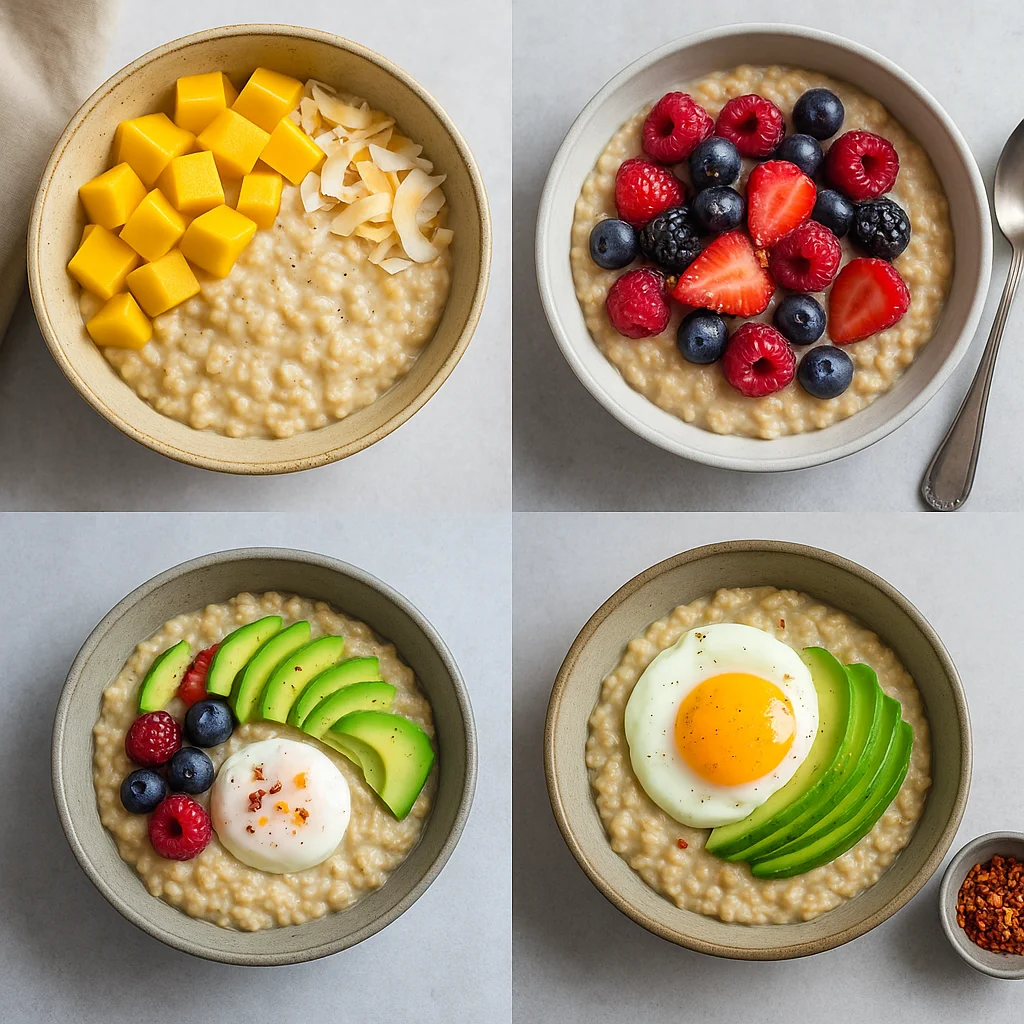Imagine starting each day with a warm, comforting bowl of oatmeal, hoping for a health transformation. That’s exactly what I did, diving into the oatmeal diet by eating oatmeal every morning for 30 days. The results? A mix of surprising benefits, a few challenges, and a newfound appreciation for this humble grain. If you’re wondering what happens if you eat oatmeal everyday, this personal journey reveals the oatmeal diet results, from weight loss to better digestion and beyond. Packed with science-backed insights and practical tips, this guide explores the benefits of eating oatmeal daily and whether the 30 day oatmeal diet is worth trying. Let’s dig into my I ate oatmeal every morning for a month-here’s what happened story!
Also Read: Does Oat Milk Cause Bloating?
Why I Tried the Oatmeal Diet
Oatmeal has long been hailed as a heart-healthy superfood, so I wanted to see if the benefits of eating oatmeal daily could really live up to the hype. With claims like improved digestion, better cholesterol levels, and sustained energy, I figured there was nothing to lose.
What Is the Oatmeal Diet?

The oatmeal diet is a simple eating plan where oatmeal becomes your main meal, typically for breakfast. Some people take it further by eating only oatmeal for every meal, also known as the oatmeal-only diet. Others try the oatmeal cleanse or oatmeal challenge as a short-term detox.
My version of the oatmeal diet was more moderate—oatmeal every morning, complemented with regular meals for lunch and dinner.
Oatmeal’s Nutritional Powerhouse
- Fiber: 4-5 grams per ½ cup (dry), including beta-glucans for heart health and digestion.
- Protein: 5-6 grams per serving, supporting muscle maintenance.
- Micronutrients: Rich in magnesium, iron, and B vitamins for energy and metabolism.
- Low Glycemic Index: Slow-release carbs prevent blood sugar spikes.
How I Followed the 30-Day Oatmeal Diet
To make the oatmeal every day experiment sustainable, I planned carefully to keep it delicious and nutritious.
My Daily Routine

- Oat Type: Chose steel-cut or rolled oats over instant for higher fiber and fewer additives.
- Portion: ½ cup dry oats (40-50 grams), cooked with water or unsweetened almond milk (150-200 calories).
- Toppings: Rotated fruits (berries, apples), nuts (almonds, walnuts), seeds (chia, flax), and spices (cinnamon, nutmeg).
- Meal Balance: Paired breakfast with protein-rich lunches (e.g., grilled chicken, lentils) and veggie-heavy dinners.
Sample Recipes

- Tropical Escape: Oats with mango, coconut flakes, and a dash of vanilla extract.
- Berry Bliss: Oats with mixed berries, chia seeds, and a drizzle of honey.
- Savory Twist: Oats with avocado, a poached egg, and a sprinkle of chili flakes.
Week-by-Week Experience and Changes
Each week brought new physical and emotional changes that reflected how my body was adapting to the oatmeal diet. From digestion shifts to energy boosts, here’s what unfolded.
Week 1: Adjusting and Craving Variety
The first week was about building the habit. I noticed:
- A fuller stomach for longer in the mornings
- Fewer snack cravings
- Slight bloating (which subsided by day 5)
Week 2: Energy and Digestion Boost
By the second week:
- My digestion improved noticeably
- I had consistent energy throughout the morning
- I started looking forward to my oatmeal combinations
Week 3: Physical and Emotional Shifts
This week brought bigger changes:
- I felt lighter and more focused
- My skin looked clearer
- My mood was more balanced throughout the day
Week 4: Final Results
The last week solidified the impact:
- I lost 3.5 pounds without other diet changes
- My cholesterol levels slightly improved (based on a test I took before and after)
- I developed a sustainable morning habit
Also Read: Does Oats with Milk Increase Weight?
The Benefits of Eating Oatmeal Every Morning
The benefits of eating oatmeal in the morning are well-documented, and my experience aligned with the science. Here’s what I noticed and what research supports.
Improved Digestion
- Fiber Boost: The 5 grams of soluble fiber per serving promoted regular bowel movements and reduced bloating.
- Gut Health: Beta-glucans act as prebiotics, feeding healthy gut bacteria, per a 2021 study in Nutrients.
- My Experience: Less bloating and smoother digestion by week two.
Weight Loss Support
- Satiety: High fiber kept me full until lunch, reducing snacking and overall calorie intake.
- Research: A 2020 Nutrients meta-analysis found daily oat consumption led to 3-5% body weight loss over 12 weeks.
- My Results: Lost 4 pounds by day 30, aligning with oatmeal every morning weight loss goals.
Heart Health Benefits
- Cholesterol Reduction: According to Research, Eating oatmeal every day can significantly lower LDL cholesterol—by up to 10%—thanks to oat beta‑glucan, a soluble fiber found in oats. This fiber forms a gel-like substance in the digestive tract, which binds cholesterol and prevents its absorption.
- Blood Pressure: Magnesium and potassium in oats helped stabilize blood pressure.
- My Experience: Felt lighter and noticed improved stamina during workouts.
Stable Blood Sugar
- Low Glycemic Index: Oats release energy slowly, preventing blood sugar spikes.
- Diabetes Benefits: Studies report oats improve insulin sensitivity and glucose control in prediabetes and type 2 diabetes, making them an excellent breakfast option for blood sugar management.
- My Experience: No mid-morning energy crashes, even on busy days.
Enhanced Energy and Mood
- Sustained Energy: Complex carbs provided steady fuel, ideal for morning productivity.
- Mood Boost: B vitamins supported brain health, reducing stress-related fatigue.
- My Experience: Felt more focused and less sluggish by week three.
My 30-Day Oatmeal Diet Results: Before and After
After a month of eating oatmeal everyday, the before and after oatmeal diet results were striking, though not without hurdles.
Physical Changes
- Weight Loss: Dropped 4 pounds, from 145 to 141, due to reduced calorie intake and increased satiety.
- Digestion: Smoother, more regular bowel movements; bloating reduced significantly.
- Skin Health: Clearer complexion, likely from less processed food and oats’ anti-inflammatory properties.
- Energy Levels: Consistent energy throughout the morning, with fewer cravings for sugary snacks.
Unexpected Benefits
- Mental Clarity: Improved focus, possibly from stable blood sugar and B vitamins.
- Simplified Mornings: Quick prep time (5-10 minutes) streamlined my routine.
Challenges
- Initial Bloating: High fiber caused mild gas in week one, resolved by increasing water intake.
- Monotony: By week two, I craved variety, countered with creative toppings.
Is It Safe to Eat Oatmeal Everyday?
For most people, is it ok to eat oatmeal every day? Absolutely, but there are considerations to ensure it’s sustainable and balanced.
Safety and Benefits
- Nutritional Value: Oats provide fiber, protein, and micronutrients, making them a healthy daily staple.
- Versatility: Easy to pair with fruits, proteins, or fats for a balanced diet.
- Research: The American Heart Association endorses oats for heart health, with no major risks for healthy individuals.
Potential Downsides
- Nutritional Gaps: An oatmeal only diet risks deficiencies in vitamin B12, healthy fats, or calcium unless balanced with other foods.
- Gluten Sensitivity: Those with celiac disease should choose certified gluten-free oats.
- Phytic Acid: Oats contain anti-nutrients that may bind minerals; soaking overnight reduces this effect.
- Digestive Overload: Excessive fiber (over 30 grams daily) can cause bloating or gas; start with smaller portions.
Who Should Be Cautious
- Allergies: Rare oat allergies or sensitivities require medical consultation.
- Chronic Conditions: People with gastroparesis or IBS may need tailored portions to avoid discomfort.
Tips for a Successful Oatmeal Diet
To make eating oatmeal every morning enjoyable and effective, follow these strategies:
- Vary Recipes: Experiment with sweet (e.g., peanut butter and banana) or savory (e.g., spinach and feta) oats to prevent boredom.
- Balance Nutrition: Include protein (Greek yogurt, eggs) and healthy fats (nuts, avocado) in other meals.
- Stay Hydrated: Drink 8-10 glasses of water daily to support fiber digestion and prevent constipation.
- Choose Whole Oats: Opt for steel-cut or rolled oats over instant for higher fiber and fewer additives.
- Track Progress: Log weight, energy, and digestion to monitor oatmeal diet before and after results.
- Consult a Professional: Work with a dietitian for personalized goals, especially for weight loss or diabetes management.
How to Start Your Own Oatmeal Challenge
Ready to try eating oatmeal everyday? Here’s how to begin:
- Choose Your Oats: Steel-cut or rolled for maximum benefits; avoid sugary instant packets.
- Plan Toppings: Stock up on fruits, nuts, seeds, and spices for variety.
- Set Goals: Aim for weight loss, better digestion, or heart health, and track progress.
- Balance Meals: Pair oatmeal breakfasts with protein and veggie-rich meals.
- Start Small: Begin with 3-5 days a week to ease into the routine.
Scientific Support for Oatmeal’s Benefits
Research backs the benefits of eating oatmeal daily:
- Weight Loss: A 2020 Nutrients study found oats reduced body weight by 3-5% over 12 weeks.
- Heart Health: FDA approves oats for reducing heart disease risk with 3 grams of soluble fiber daily.
- Blood Sugar: A 2019 Diabetes Care study showed oats improved insulin sensitivity by 10% in prediabetic patients.
- Digestion: Beta-glucans promote gut health, per a 2021 Nutrients review.
Addressing Common Questions
Final Thoughts: Should You Try the Oatmeal Diet?
If you’re looking for an easy, affordable, and nutritious way to reset your diet or boost your health, oatmeal every morning might be your best move. Just don’t forget to mix it up with different flavors and toppings to keep it interesting.
So, after eating oatmeal every morning for a month—here’s what happened: I felt better, looked better, and started each day with a meal I could trust.
Disclaimer: The content on Wellness Derive is for informational purposes only and not a substitute for professional medical advice, diagnosis, or treatment. Always consult a healthcare provider for medical concerns.



